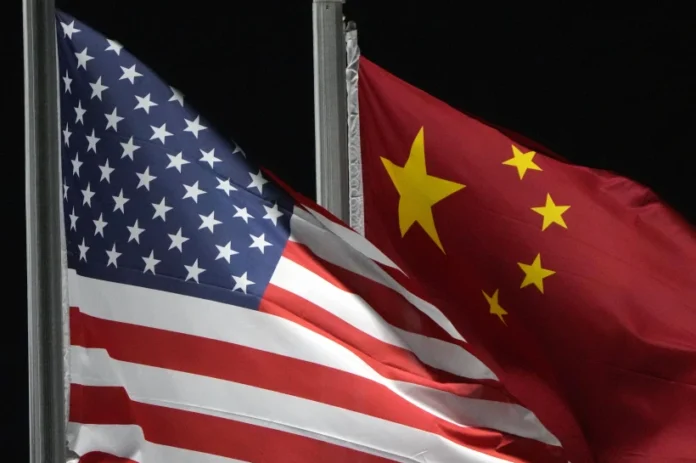BEIJING (AP)-China’s defense ministry has accused the US of escalating tensions and turning Taiwan into a potential conflict zone, accusing the US of recently agreeing to sell Taiwan $440 million worth of military equipment. The sale includes a variety of military items such as 30 mm ammunition, spare parts, small arms, combat weapon systems and logistics equipment.
Although Taiwan operates as an independent democracy, China claims sovereignty over it and considers it part of its territory. The Chinese government has expressed opposition to any form of foreign interference in its internal affairs. In response to the U.S. sale, Chinese Defense Ministry spokesman Col. Tan Kefei accused the U.S. of ignoring China’s core concerns, interfering in China’s internal affairs, and deliberately escalating cross-strait tensions. Is. Tan said China has made “severe accusations” against the US over the issue.
He stressed that China has long maintained its stance on Taiwan and will use force if necessary to stop Taiwan’s independence efforts. Mr. Tang reiterated this position, saying that any attempt to achieve independence through force would be considered “wishful thinking” and doomed to failure. He stressed that the People’s Liberation Army (PLA) is always ready and committed to maintain peace and stability in the Taiwan Strait. The US has a “one China” policy and officially recognizes Beijing as the legitimate government of China. However, US law requires Taiwan to provide a credible defense capability and requires the United States to treat any threat to Taiwan as cause for serious concern. Although the United States does not have formal diplomatic relations with Taiwan, it is committed to assisting Taiwan’s defense.
China regularly conducts military operations near Taiwan, including sending warships and aircraft into Taiwan’s air defense zone across the Midline of the Taiwan Strait. The actions are seen as an attempt to intimidate Taiwan’s 23 million people and undermine its military preparedness. China has a larger military power than Taiwan in terms of size and resources, but Taiwan has focused on improving its defense capabilities and sought help from other countries. In addition to US arms sales, Taiwan is actively revitalizing its domestic defense industry, improving military training, and expanding public conscription.
Despite China’s military superiority, Taiwan hopes to develop enough deterrents to hold off Chinese forces long enough before help from international allies arrives. Recent U.S. arms sales are intended to support Taiwan’s continued efforts to modernize its military, maintain a credible defense capability, and enhance regional stability and security.
Tensions remain in the Taiwan Strait, with China’s military activities and US support for Taiwan’s defense raising concerns that tensions could escalate. The majority of Taiwanese continue to support Taiwan’s current de facto independence, which resulted from its separation from mainland China during the 1949 civil war.
China’s defense ministry’s harsh condemnation of the US sale reflects Beijing’s firm stance on Taiwan. China views Taiwan as an integral part of its territory and views foreign support for Taiwan as interference in its internal affairs. China’s response, including military activity near Taiwan, demonstrates China’s determination to thwart pro-independence movements and hold fast to its claims to Taiwan.
The U.S. approval of arms sales to Taiwan demonstrates the U.S. commitment to defending Taiwan and complying with its obligations under U.S. law. Although the United States officially recognizes Beijing as China’s legitimate government, it continues to support Taiwan’s defense capabilities. This highlights the delicate balance that the United States maintains between adhering to the One China policy and ensuring Taiwan’s security.
The Taiwan Strait is a highly sensitive area, and any escalation in tensions between China and Taiwan would have far-reaching implications for regional stability and security. China’s military activities near Taiwan, coupled with U.S. support for Taiwan, increase the risk of unforeseen events and miscalculations that could potentially trigger a regional spillover conflict.
Taiwan’s defense approach focuses on developing a credible deterrent against Chinese aggression and enlisting support from international allies. Taiwan’s efforts to modernize its armed forces, revitalize its domestic defense industry, and expand its military service reflect Taiwan’s determination to improve its defense capabilities and withstand potential threats.
The majority of Taiwanese still support maintaining the island’s de facto independence. This sentiment is rooted in Taiwan’s historical separation from mainland China and its development as a separate political and economic entity. The Taiwanese people’s resilience to China’s military activity shows their strong determination to defend their democratic institutions and way of life.
US arms sales to Taiwan and China’s response could further strain cross-strait relations. China has consistently opposed formal exchanges between Taiwan and other countries, and US support for Taiwan challenges the status quo China wants. Both sides’ continued military postures and rhetoric have raised concerns about cross-strait stability and the possibility of military conflict.






